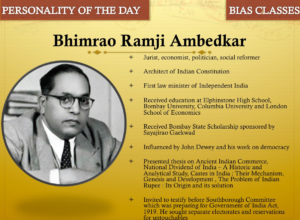Babasaheb of the Bahujans
Mains GS Paper I: Modern Indian history from middle of eighteenth century until the present-significant events, personalities, issues etc
ARTICLE SUMMARY
- Mahaparinirvan Diwas is observed every year on December 6 to commemorate the death anniversary of B R Ambedkar.
- He is known as the Father of the Indian Constitution and was independent India’s first law minister.
Context
Dr. B R Ambedkar:
- He was born on 14 April 1891 in Mhow, Central Province (now Madhya Pradesh).
- He founded the Bahishkrit Hitkarini Sabha (1923).
- Mahad Satyagraha: He led the Mahad Satyagraha in March 1927 to challenge the regressive customs of the Hindus.
- Round table conferences: He participated in all three round-table conferences.
Major contributions:
- Indian constitution: Main Architect of Indian Constitution
- Constitutional morality: Effective coordination between conflicting interests of different people and administrative cooperation.
- Social Reforms: devoted his life to remove untouchability.
- ‘Bahishkrit Hitkarini Sabha (Outcastes Welfare Association)-1923
- The temple entry movement launched by Dr. Ambedkar in 1930 at Kalaram temple, Nasik.
- Attended all the three Round Table Conferences (1930-32).
- In 1936: founded the Independent Labour Party.
- In 1990: Dr. B. R. Ambedkar, was bestowed with Bharat Ratna.
Few important works of Dr. Ambedkar:
- Mook Nayak (weekly) 1920
- Janta (weekly) 1930
- The Annihilation of Caste 1936
- The Untouchables 1948
- Buddha Or Karl Marx 1956
Issues Dalit women used to face:
- Dalit women’s autobiographies: They show how illiteracy, poverty, fights, squalor were relentless in the basti, and women suffered cruelty and degradation.
- Mukta Sarvagod’s book-Mitali Kavade (Closed Doors):
- teenage daughters-in-law were starved, beaten and worked to death.
- Superstition was rampant
- Women be accused of being possessed by spirits
- young girls would be dedicated to temples, where they would become prostitutes.
- Kumud Pawade(Antasphot (Inner Blast): pativrata” models of Sita and Savitri had a deep impact on women, who fasted for violent philandering drunken husbands.
Ambedkar’s role in uplifting Dalit women;
- Baby Kamble in Jine Amuche (Our Lives): The message of Buddha filled with compassion came through Baba.
- Ambedkar told the women:
- Men and women are partners in a marriage
- Treat your husband with equality
- Send your children to school
- Wear clean clothes
Important contribution as policy maker:
- Indian constitution: Main Architect of Indian Constitution
- Hindu Code Bill:
- It revolutionized the Hindu domestic sphere.
- Offering women the right to marry by choice and across caste boundaries
- Given them the right to divorce
- Right to inherit property.
India’s position in 2022:
- India has been ranked at 107 in the Global Hunger Index
- 150 in the Press Freedom Index
- 136 in the World Happiness Index
- 85th position in the Corruption Perception Index
- 71 on the Global Food Security Index
- 77 on the Rule of Law Index
- 46 in the Democracy Index.
Ambedkar about Minorities:
- Ambedkar’s idea of minorities: included Muslims, Christians and other religious minorities along with Dalits and weaker sections of society.
- “Minority communities may be crushed. If not crushed they may be tyrannized and oppressed. They are sure to be discriminated against and denied equality before the law and equal opportunity in public life”.
- Minorities would feel insecure and get excluded from all spheres including politics because of the communally-charged electoral process.
Way Forward
- Constitutional morality: Ambedkar underlined the point that the cultivation of constitutional morality by every citizen is a categorical imperative to uphold the constitutional vision of India.
- Ambedkar called for the adoption of the constitutional route to achieve social and political goals and cautioned that any other method would spell the grammar of anarchy.
- Issues raised by Ambedkar: We should be mindful of the issues raised by Ambedkar and adopt the constitutional method to save it from calamity.
QUESTION FOR MAINS
- Are tolerance, assimilation and pluralism the key elements in the making of an Indian form of secularism? Justify your answer. (UPSC 2022) (200 WORDS, 10 MARKS)




